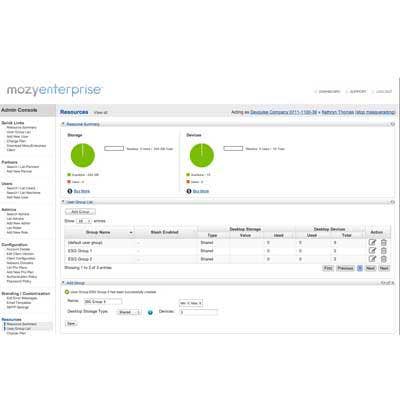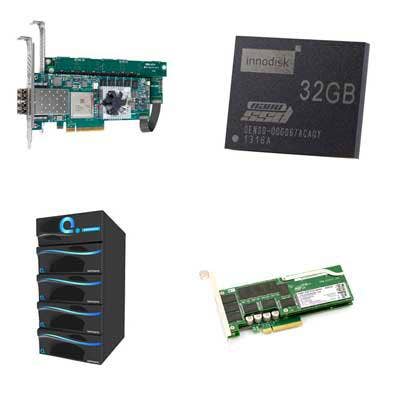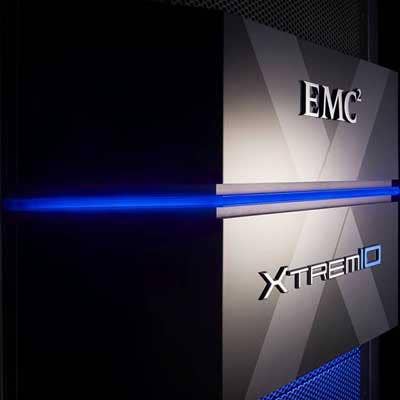The 10 Biggest Storage Stories Of 2013

2013: A Year Of Huge Shifts For The Storage Industry
The storage industry went through a series of major upheavals in 2013.
It was a year in which we saw the rise of software-defined storage and the fall of storage hardware sales, growth in cloud storage and the death of cloud storage providers, and a massive rush to grab mind share in flash storage even as the flash storage industry started its inevitable consolidation.
CRN was there watching it all unfold. Turn the page to see just how interesting a year it was with a look at all the key trends and key players in storage in 2013.

10. Better-Than-Baby Steps For Software-Defined Storage
Software-defined storage has caught on throughout the storage industry as hardware and software vendors either rolled out technology to help move storage functionality away from the hardware, or at least declared their products ready for it.
The software-defined storage charge is being led by a host of software-only startups such as Jeda Networks and SwiftStack, as well as some older software developers like DataCore Software, all of whom hope customers accept commodity hardware over traditional proprietary arrays.
Also driving the market is the king of storage hardware, EMC, which has assets such as VMware in place to do well even if the hardware part falters.
Now if the industry could just settle on a common definition of what "software-defined storage" means. ...

9. Data Growth Hot, Revenue Not
2013 was a tough year for storage hardware vendors.
IDC said first-quarter 2013 storage hardware revenue fell 0.9 percent over last year, the first year-over-year revenue decline since 2009. That was followed by a drop of 0.8 percent in the second quarter and 3.5 percent in the third quarter.
This was despite capacity growth of 26.4 percent in the first quarter, 21.5 percent in the second quarter, and 16.1 percent in the third quarter.
Storage software sales fared somewhat better. IDC said first-quarter 2013 storage software sales rose 3.2 percent over the prior year, followed by 4.1 percent growth in the second quarter and 1.5 percent growth in the third quarter.
At least the backup appliance market did well, with first-quarter year-over-year growth of 16.5 percent and 7.3 percent in the second quarter, according to IDC.

8. Storage IPOs: The Good And The Bad
It was the best of both worlds for storage IPOs in 2013.
Nimble Storage in December had one of the best IPOs in any industry in 2013. It priced its shares at $21, raising $168 million to give the company a valuation of $2.2 billion. However, its share price jumped to over $31 on opening day, and $35 the next business day.
Barracuda Networks also had a successful IPO, gaining $100 million on its opening day and watching its share prices continue to grow.
Contrast those with Violin Memory, which in September priced its IPO at $9 per share, only to see first-day prices slip to about $7. By mid-December, shares of Violin Memory were as low as $2.56. However, prices recovered somewhat after Violin Memory fired its CEO, Don Basile.

7. Army Of Startups
2013 was a hot market for storage startups as the storage industry shifted in response to such trends as falling hardware array sales, rising flash storage and SSD sales, and the chance that software-defined storage technology could disrupt the entire business.
If that doesn't provide an environment for startups to come in and try their hand at stirring up the establishment, nothing does. In fact, that is exactly what happened in 2013 as storage startups either came out of stealth mode or unveiled their first products in such areas as cloud storage, flash storage, unstructured data and software-defined storage.

6. Storage Funding High
2013 was a very good year for several storage vendors who reported large rounds of funding. Storage funding winners included:
-- $150 million for Pure Storage, in what is likely a record funding round for an enterprise storage startup.
-- $58 million for SimpliVity, to help develop technology and markets for its OmniCube converged infrastructure technology.
-- $51.6 million for cloud storage company Skyera in a round led by Dell.
-- $31 million for all-flash array developer SolidFire in a round led by flash memory manufacturer Samsung.
And others, including $25 million for cloud storage gateway developer Panzura; $20 million for storage optimization software developer Atlantis Computing; $17 million for distributed enterprise storage developer Maginatics; $13 million for Ceph developer InkTank; $13 million for cloud disaster recovery provider Zerto; and $10 million for cloud backup developer SageCloud.

5. Rush Along The Acquisition Trail
One helluva lot of storage companies also got acquired in 2013, including:
-- Storage component maker LSI by networking component maker Avago.
-- Tape and backup device vendor Tandberg Data by Overland Storage.
-- Unitrends, acquired by Insight Venture Partners, later acquired by PHD Virtual, which earlier bought VirtualSharp.
-- EMC acquired ScaleIO for its software-defined storage technology.
-- Fusion-io acquired ID7 for software-defined storage.
-- Western Digital acquired Arkeia Software for SMB data protection.
-- EMC grabbed storage automation software developer iWave.
-- Imation purchased Nexsan.
And don't miss all the file sync/share developers and flash storage developers acquired this year and appearing on pages 10 and 11.

4. File Sync/Share Grows Up
The developers of file sync and share applications, which started out as consumer apps, this year took significant steps to add the kind of security and management control required by enterprise customers.
-- Dropbox unveiled a new developer platform that lets iOS or Android apps treat the Dropbox service as if it were a local file system on a device.
-- Box acquired dLoop's data analytics technology for discovering content and capturing that content's insights.
-- EMC enhanced its Syncplicity enterprise file sync and share application with new group-level policy assignment and rights management control when sharing files.
-- Mozy (pictured) enhanced its business-focused offerings with new file sync capabilities.
-- Cloud backup and disaster recovery provider eFolder acquired file sync and share developer Anchor Box.
-- Egnyte added enterprise document collaboration and sharing for Google Drive.

3. Flash Consolidates
Flash storage has become a fast-growing part of the storage and server market as applications require increasingly high-performance ways to read and write their data. 2013 finally saw the start of the kind of consolidation every new market experiences as several flash storage firms closed or were acquired.
-- Ailing SSD pioneer OCZ was acquired by Toshiba.
-- Flash storage component maker LSI was acquired by networking component maker Avago.
-- Cisco bought flash storage vendor Whiptail.
-- Western Digital acquired Virident fairly quickly after acquiring SSD vendor sTec.
-- SanDisk acquired Smart Storage Systems.
-- Hybrid flash-disk array maker Starboard Storage closed after failing to find a buyer.

2. Big Iron Unveils Flash Strategies
While the small flash storage startups got a lot of ink in 2013, the top storage vendors also unveiled their flash storage strategies or first products, including:
-- EMC released XtremIO all-flash arrays (pictured) 18 months after acquiring its original Israel-based developer.
-- NetApp unveiled its upcoming "FlashRay" flash storage arrays for high-performance applications.
-- IBM unveiled plans to invest $1 billion through 2015 on developing flash technology , and released an all-flash array based on its 2012 acquisition of Texas Memory Systems.
-- HP introduced an all-flash version of its 3PAR storage array.
-- Dell introduced tiering between different types of flash, as well as all-flash versions of its Compellent and EqualLogic arrays.
-- Hitachi Data Systems (HDS) added flash storage modules to its Hitachi Unified Storage (HUS) 150 arrays.

1. Storage Clouds Dissipate
While the use of storage clouds for primary backup, archive and disaster recovery data continued to grow in 2013, an ill wind blew through the industry to dissipate some of those clouds, including:
-- Nirvanix closed its doors and kicked customers off its storage cloud after bleeding too much money competing against Amazon.
-- Symantec backed off from public cloud storage by unveiling plans to end its Backup Exec.cloud offering.
-- Cloud backup appliance developer Trustyd closed its doors after running out of cash.
-- Zenith InfoTech was ordered by a Bombay, India, court to sell its cloud storage business to pay back the company's foreign currency convertible bond (FCCB) holders.